Case Study Analysis: Hospitality Management & Technology Integration
VerifiedAdded on 2020/05/28
|20
|4520
|218
Case Study
AI Summary
This case study analyzes the impact of technology on the hospitality industry, focusing on how technological advancements influence operations and customer satisfaction. It begins with an executive summary and table of contents, followed by an introduction outlining the research hypothesis: that technology significantly affects the tourism and hospitality sector. The study then delves into philosophical theories, including ontology, epistemology, and axiology, to provide a framework for understanding the research. It examines research philosophies such as positivism, interpretivism, and critical philosophy, with a particular emphasis on interpretive philosophy as the most suitable for this case. The report then explores qualitative and quantitative research methodologies, discussing data collection and analysis methods for each. A mixed methodology approach is proposed, and the ethics of research are addressed. The conclusion highlights the benefits of technology in enhancing productivity and customer satisfaction. The case study offers valuable insights into the integration of technology within hospitality management and provides a comprehensive overview of the research process.
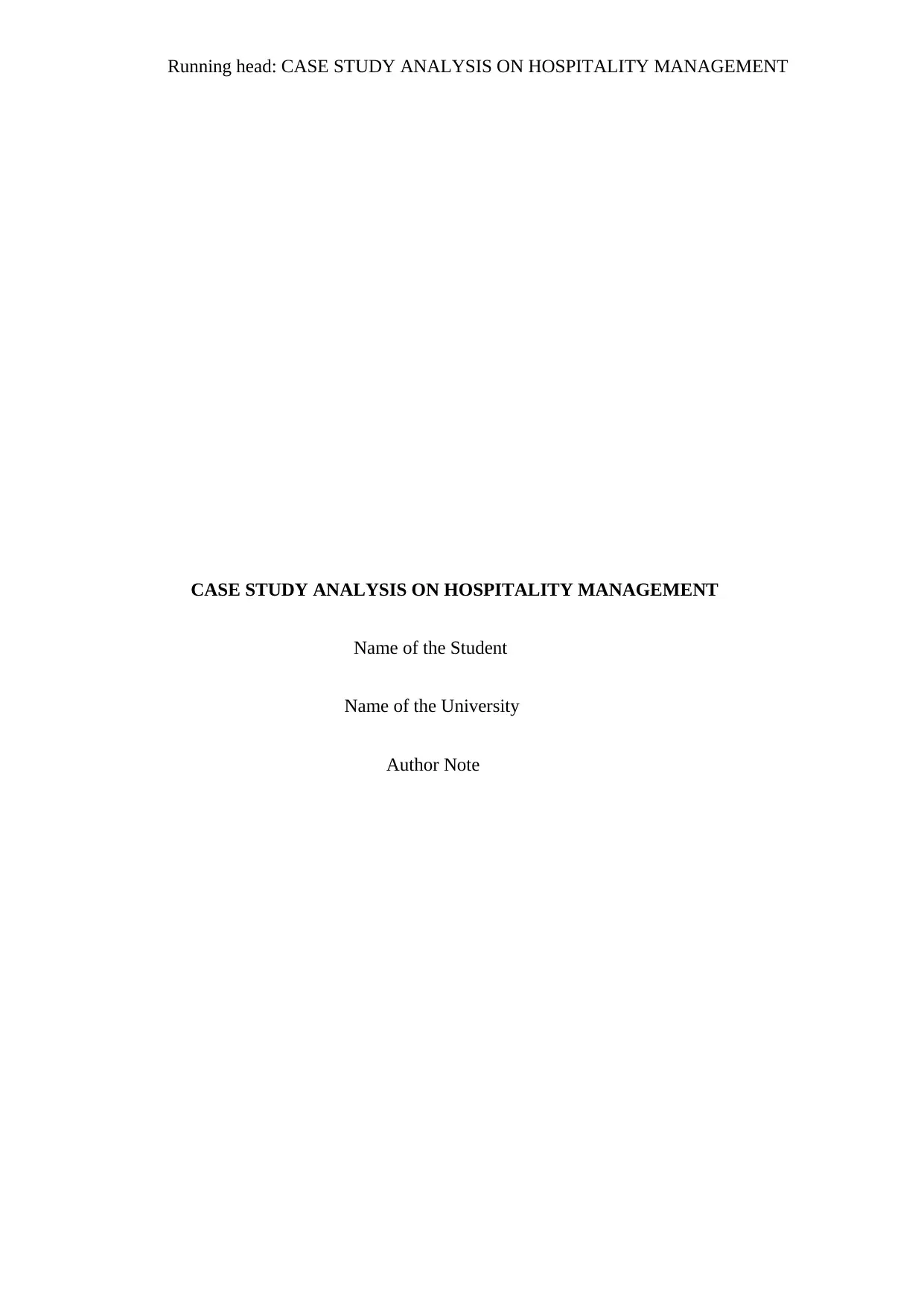
Running head: CASE STUDY ANALYSIS ON HOSPITALITY MANAGEMENT
CASE STUDY ANALYSIS ON HOSPITALITY MANAGEMENT
Name of the Student
Name of the University
Author Note
CASE STUDY ANALYSIS ON HOSPITALITY MANAGEMENT
Name of the Student
Name of the University
Author Note
Paraphrase This Document
Need a fresh take? Get an instant paraphrase of this document with our AI Paraphraser
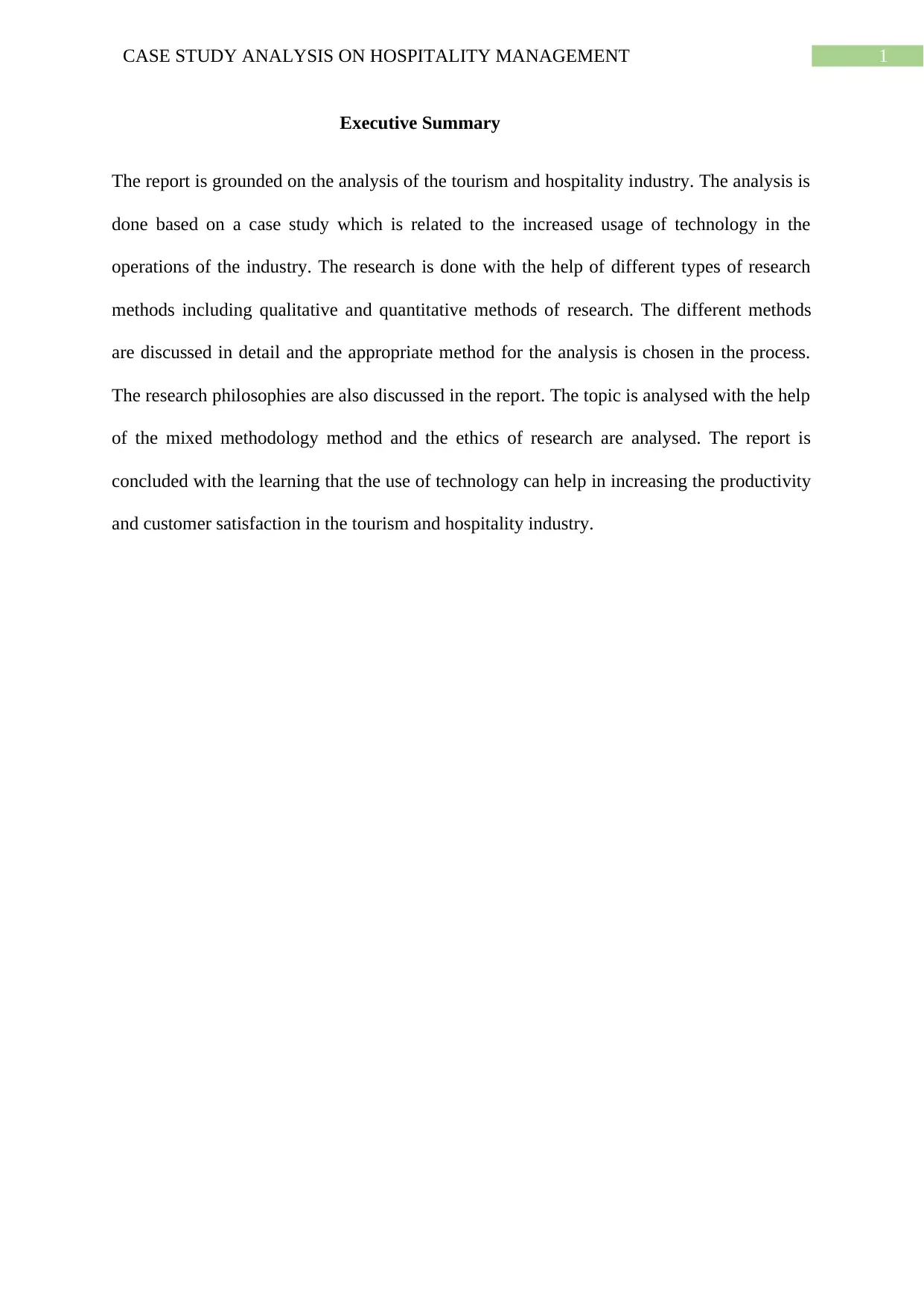
1CASE STUDY ANALYSIS ON HOSPITALITY MANAGEMENT
Executive Summary
The report is grounded on the analysis of the tourism and hospitality industry. The analysis is
done based on a case study which is related to the increased usage of technology in the
operations of the industry. The research is done with the help of different types of research
methods including qualitative and quantitative methods of research. The different methods
are discussed in detail and the appropriate method for the analysis is chosen in the process.
The research philosophies are also discussed in the report. The topic is analysed with the help
of the mixed methodology method and the ethics of research are analysed. The report is
concluded with the learning that the use of technology can help in increasing the productivity
and customer satisfaction in the tourism and hospitality industry.
Executive Summary
The report is grounded on the analysis of the tourism and hospitality industry. The analysis is
done based on a case study which is related to the increased usage of technology in the
operations of the industry. The research is done with the help of different types of research
methods including qualitative and quantitative methods of research. The different methods
are discussed in detail and the appropriate method for the analysis is chosen in the process.
The research philosophies are also discussed in the report. The topic is analysed with the help
of the mixed methodology method and the ethics of research are analysed. The report is
concluded with the learning that the use of technology can help in increasing the productivity
and customer satisfaction in the tourism and hospitality industry.
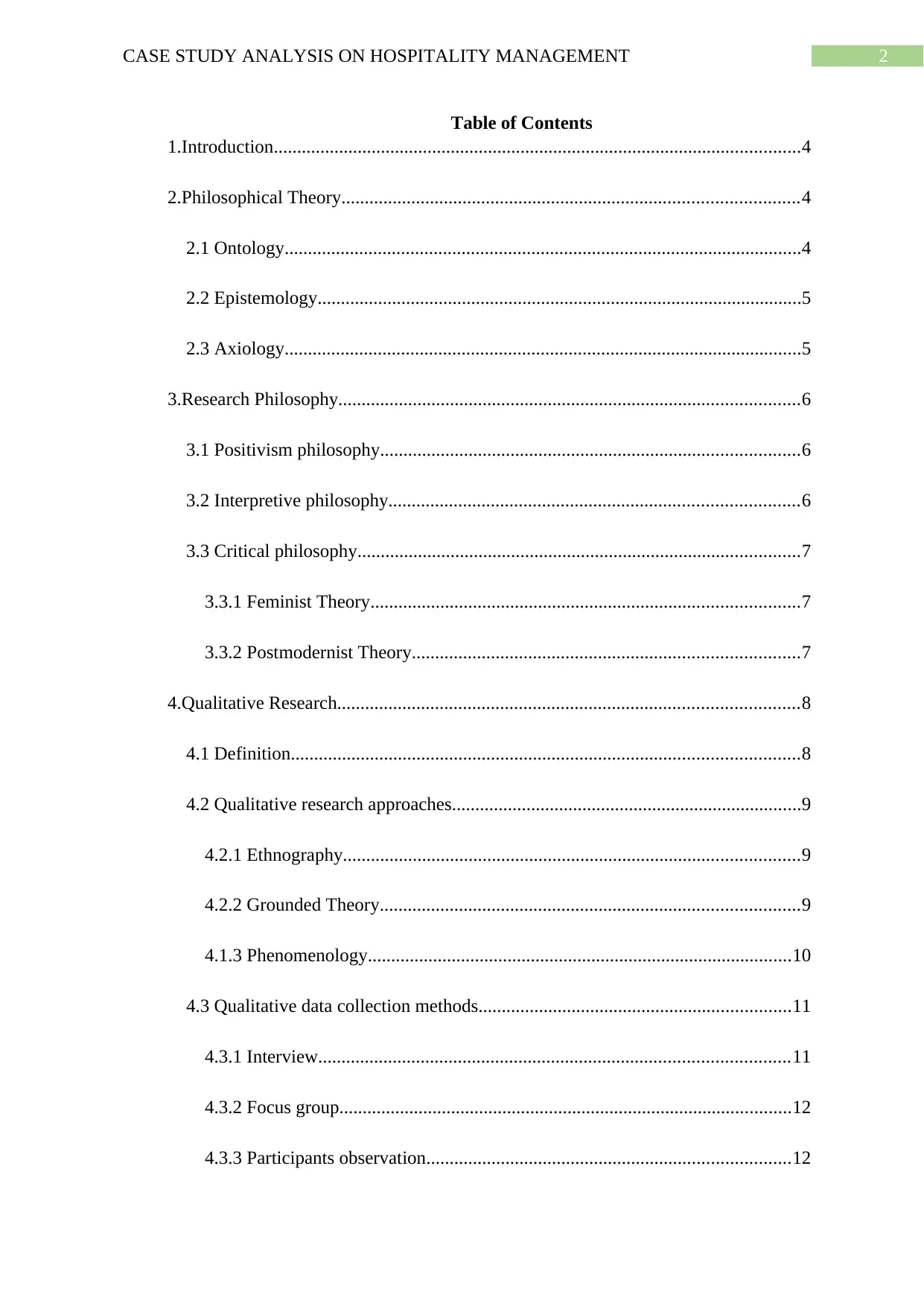
2CASE STUDY ANALYSIS ON HOSPITALITY MANAGEMENT
Table of Contents
1.Introduction.................................................................................................................4
2.Philosophical Theory..................................................................................................4
2.1 Ontology...............................................................................................................4
2.2 Epistemology........................................................................................................5
2.3 Axiology...............................................................................................................5
3.Research Philosophy...................................................................................................6
3.1 Positivism philosophy..........................................................................................6
3.2 Interpretive philosophy........................................................................................6
3.3 Critical philosophy...............................................................................................7
3.3.1 Feminist Theory............................................................................................7
3.3.2 Postmodernist Theory...................................................................................7
4.Qualitative Research...................................................................................................8
4.1 Definition.............................................................................................................8
4.2 Qualitative research approaches...........................................................................9
4.2.1 Ethnography..................................................................................................9
4.2.2 Grounded Theory..........................................................................................9
4.1.3 Phenomenology...........................................................................................10
4.3 Qualitative data collection methods...................................................................11
4.3.1 Interview.....................................................................................................11
4.3.2 Focus group.................................................................................................12
4.3.3 Participants observation..............................................................................12
Table of Contents
1.Introduction.................................................................................................................4
2.Philosophical Theory..................................................................................................4
2.1 Ontology...............................................................................................................4
2.2 Epistemology........................................................................................................5
2.3 Axiology...............................................................................................................5
3.Research Philosophy...................................................................................................6
3.1 Positivism philosophy..........................................................................................6
3.2 Interpretive philosophy........................................................................................6
3.3 Critical philosophy...............................................................................................7
3.3.1 Feminist Theory............................................................................................7
3.3.2 Postmodernist Theory...................................................................................7
4.Qualitative Research...................................................................................................8
4.1 Definition.............................................................................................................8
4.2 Qualitative research approaches...........................................................................9
4.2.1 Ethnography..................................................................................................9
4.2.2 Grounded Theory..........................................................................................9
4.1.3 Phenomenology...........................................................................................10
4.3 Qualitative data collection methods...................................................................11
4.3.1 Interview.....................................................................................................11
4.3.2 Focus group.................................................................................................12
4.3.3 Participants observation..............................................................................12
⊘ This is a preview!⊘
Do you want full access?
Subscribe today to unlock all pages.

Trusted by 1+ million students worldwide
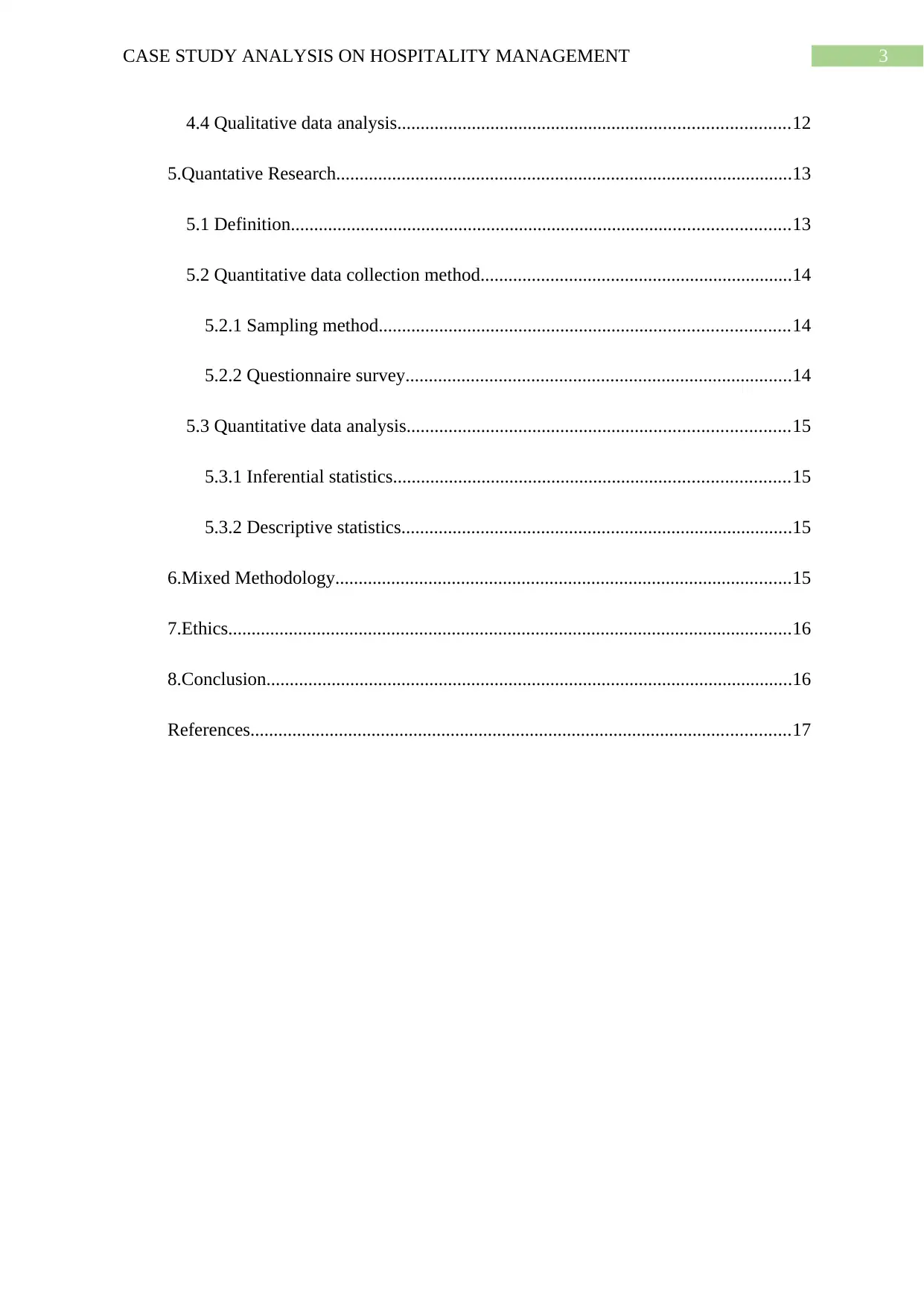
3CASE STUDY ANALYSIS ON HOSPITALITY MANAGEMENT
4.4 Qualitative data analysis....................................................................................12
5.Quantative Research..................................................................................................13
5.1 Definition...........................................................................................................13
5.2 Quantitative data collection method...................................................................14
5.2.1 Sampling method........................................................................................14
5.2.2 Questionnaire survey...................................................................................14
5.3 Quantitative data analysis..................................................................................15
5.3.1 Inferential statistics.....................................................................................15
5.3.2 Descriptive statistics....................................................................................15
6.Mixed Methodology..................................................................................................15
7.Ethics.........................................................................................................................16
8.Conclusion.................................................................................................................16
References....................................................................................................................17
4.4 Qualitative data analysis....................................................................................12
5.Quantative Research..................................................................................................13
5.1 Definition...........................................................................................................13
5.2 Quantitative data collection method...................................................................14
5.2.1 Sampling method........................................................................................14
5.2.2 Questionnaire survey...................................................................................14
5.3 Quantitative data analysis..................................................................................15
5.3.1 Inferential statistics.....................................................................................15
5.3.2 Descriptive statistics....................................................................................15
6.Mixed Methodology..................................................................................................15
7.Ethics.........................................................................................................................16
8.Conclusion.................................................................................................................16
References....................................................................................................................17
Paraphrase This Document
Need a fresh take? Get an instant paraphrase of this document with our AI Paraphraser
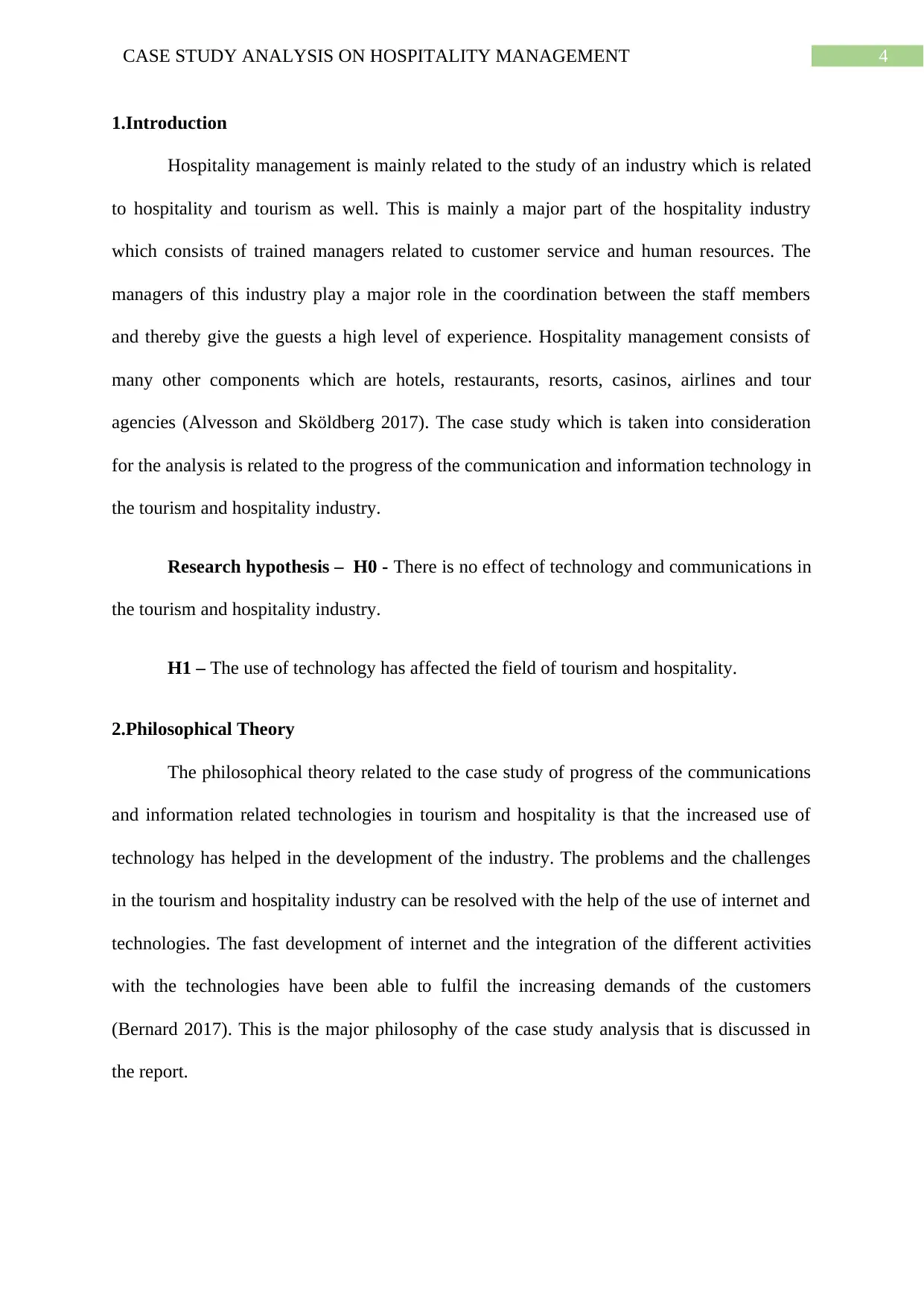
4CASE STUDY ANALYSIS ON HOSPITALITY MANAGEMENT
1.Introduction
Hospitality management is mainly related to the study of an industry which is related
to hospitality and tourism as well. This is mainly a major part of the hospitality industry
which consists of trained managers related to customer service and human resources. The
managers of this industry play a major role in the coordination between the staff members
and thereby give the guests a high level of experience. Hospitality management consists of
many other components which are hotels, restaurants, resorts, casinos, airlines and tour
agencies (Alvesson and Sköldberg 2017). The case study which is taken into consideration
for the analysis is related to the progress of the communication and information technology in
the tourism and hospitality industry.
Research hypothesis – H0 - There is no effect of technology and communications in
the tourism and hospitality industry.
H1 – The use of technology has affected the field of tourism and hospitality.
2.Philosophical Theory
The philosophical theory related to the case study of progress of the communications
and information related technologies in tourism and hospitality is that the increased use of
technology has helped in the development of the industry. The problems and the challenges
in the tourism and hospitality industry can be resolved with the help of the use of internet and
technologies. The fast development of internet and the integration of the different activities
with the technologies have been able to fulfil the increasing demands of the customers
(Bernard 2017). This is the major philosophy of the case study analysis that is discussed in
the report.
1.Introduction
Hospitality management is mainly related to the study of an industry which is related
to hospitality and tourism as well. This is mainly a major part of the hospitality industry
which consists of trained managers related to customer service and human resources. The
managers of this industry play a major role in the coordination between the staff members
and thereby give the guests a high level of experience. Hospitality management consists of
many other components which are hotels, restaurants, resorts, casinos, airlines and tour
agencies (Alvesson and Sköldberg 2017). The case study which is taken into consideration
for the analysis is related to the progress of the communication and information technology in
the tourism and hospitality industry.
Research hypothesis – H0 - There is no effect of technology and communications in
the tourism and hospitality industry.
H1 – The use of technology has affected the field of tourism and hospitality.
2.Philosophical Theory
The philosophical theory related to the case study of progress of the communications
and information related technologies in tourism and hospitality is that the increased use of
technology has helped in the development of the industry. The problems and the challenges
in the tourism and hospitality industry can be resolved with the help of the use of internet and
technologies. The fast development of internet and the integration of the different activities
with the technologies have been able to fulfil the increasing demands of the customers
(Bernard 2017). This is the major philosophy of the case study analysis that is discussed in
the report.
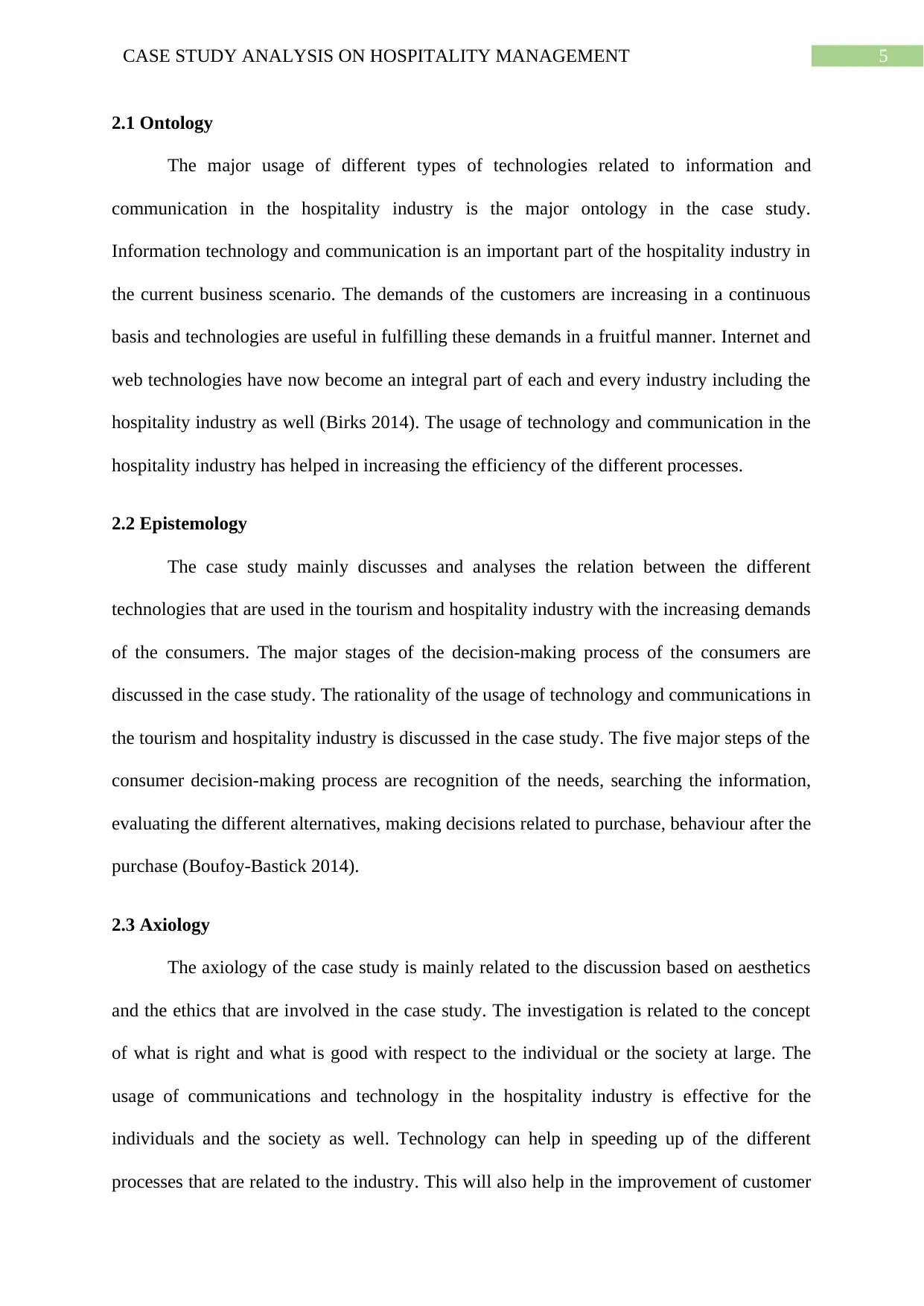
5CASE STUDY ANALYSIS ON HOSPITALITY MANAGEMENT
2.1 Ontology
The major usage of different types of technologies related to information and
communication in the hospitality industry is the major ontology in the case study.
Information technology and communication is an important part of the hospitality industry in
the current business scenario. The demands of the customers are increasing in a continuous
basis and technologies are useful in fulfilling these demands in a fruitful manner. Internet and
web technologies have now become an integral part of each and every industry including the
hospitality industry as well (Birks 2014). The usage of technology and communication in the
hospitality industry has helped in increasing the efficiency of the different processes.
2.2 Epistemology
The case study mainly discusses and analyses the relation between the different
technologies that are used in the tourism and hospitality industry with the increasing demands
of the consumers. The major stages of the decision-making process of the consumers are
discussed in the case study. The rationality of the usage of technology and communications in
the tourism and hospitality industry is discussed in the case study. The five major steps of the
consumer decision-making process are recognition of the needs, searching the information,
evaluating the different alternatives, making decisions related to purchase, behaviour after the
purchase (Boufoy-Bastick 2014).
2.3 Axiology
The axiology of the case study is mainly related to the discussion based on aesthetics
and the ethics that are involved in the case study. The investigation is related to the concept
of what is right and what is good with respect to the individual or the society at large. The
usage of communications and technology in the hospitality industry is effective for the
individuals and the society as well. Technology can help in speeding up of the different
processes that are related to the industry. This will also help in the improvement of customer
2.1 Ontology
The major usage of different types of technologies related to information and
communication in the hospitality industry is the major ontology in the case study.
Information technology and communication is an important part of the hospitality industry in
the current business scenario. The demands of the customers are increasing in a continuous
basis and technologies are useful in fulfilling these demands in a fruitful manner. Internet and
web technologies have now become an integral part of each and every industry including the
hospitality industry as well (Birks 2014). The usage of technology and communication in the
hospitality industry has helped in increasing the efficiency of the different processes.
2.2 Epistemology
The case study mainly discusses and analyses the relation between the different
technologies that are used in the tourism and hospitality industry with the increasing demands
of the consumers. The major stages of the decision-making process of the consumers are
discussed in the case study. The rationality of the usage of technology and communications in
the tourism and hospitality industry is discussed in the case study. The five major steps of the
consumer decision-making process are recognition of the needs, searching the information,
evaluating the different alternatives, making decisions related to purchase, behaviour after the
purchase (Boufoy-Bastick 2014).
2.3 Axiology
The axiology of the case study is mainly related to the discussion based on aesthetics
and the ethics that are involved in the case study. The investigation is related to the concept
of what is right and what is good with respect to the individual or the society at large. The
usage of communications and technology in the hospitality industry is effective for the
individuals and the society as well. Technology can help in speeding up of the different
processes that are related to the industry. This will also help in the improvement of customer
⊘ This is a preview!⊘
Do you want full access?
Subscribe today to unlock all pages.

Trusted by 1+ million students worldwide
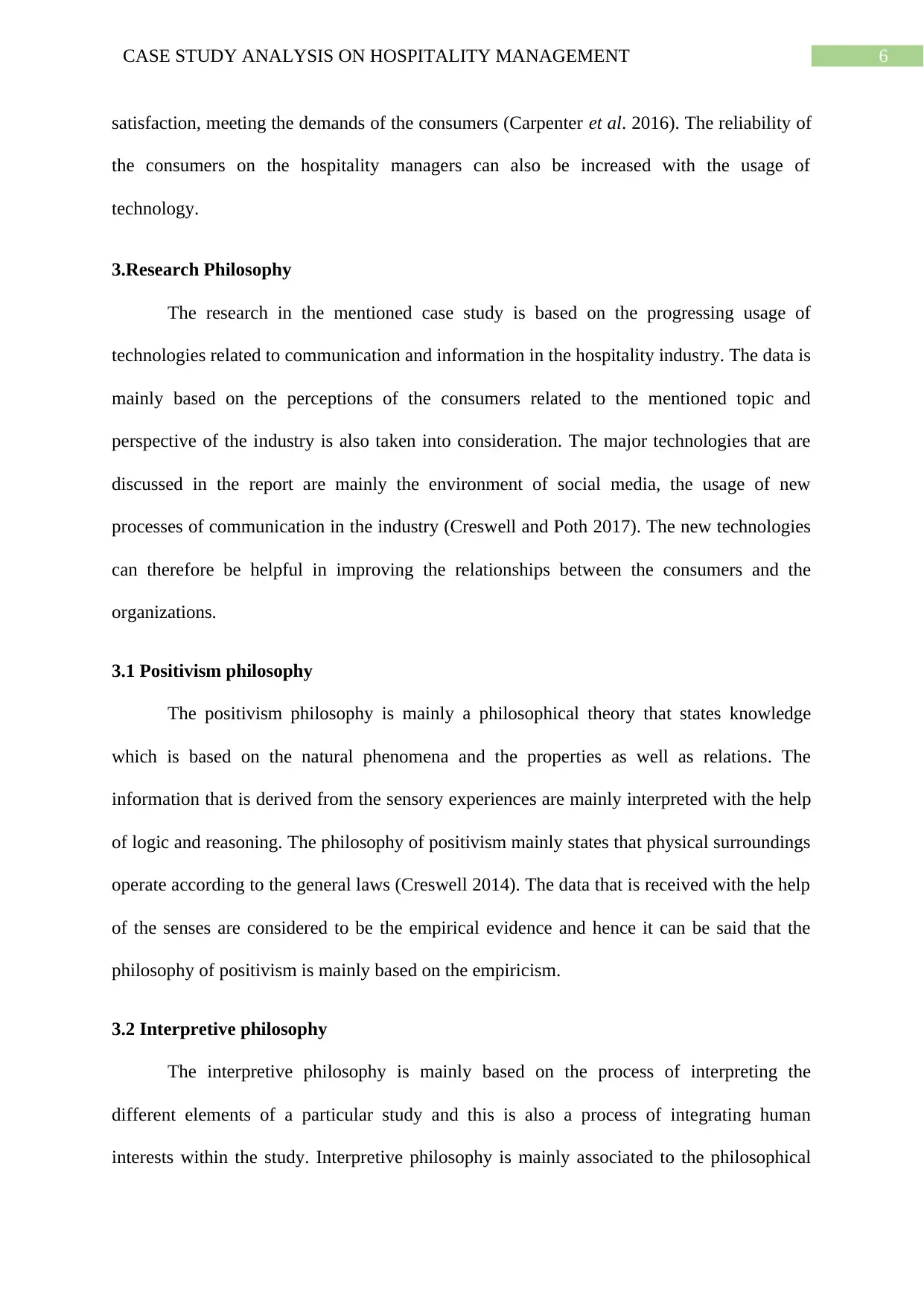
6CASE STUDY ANALYSIS ON HOSPITALITY MANAGEMENT
satisfaction, meeting the demands of the consumers (Carpenter et al. 2016). The reliability of
the consumers on the hospitality managers can also be increased with the usage of
technology.
3.Research Philosophy
The research in the mentioned case study is based on the progressing usage of
technologies related to communication and information in the hospitality industry. The data is
mainly based on the perceptions of the consumers related to the mentioned topic and
perspective of the industry is also taken into consideration. The major technologies that are
discussed in the report are mainly the environment of social media, the usage of new
processes of communication in the industry (Creswell and Poth 2017). The new technologies
can therefore be helpful in improving the relationships between the consumers and the
organizations.
3.1 Positivism philosophy
The positivism philosophy is mainly a philosophical theory that states knowledge
which is based on the natural phenomena and the properties as well as relations. The
information that is derived from the sensory experiences are mainly interpreted with the help
of logic and reasoning. The philosophy of positivism mainly states that physical surroundings
operate according to the general laws (Creswell 2014). The data that is received with the help
of the senses are considered to be the empirical evidence and hence it can be said that the
philosophy of positivism is mainly based on the empiricism.
3.2 Interpretive philosophy
The interpretive philosophy is mainly based on the process of interpreting the
different elements of a particular study and this is also a process of integrating human
interests within the study. Interpretive philosophy is mainly associated to the philosophical
satisfaction, meeting the demands of the consumers (Carpenter et al. 2016). The reliability of
the consumers on the hospitality managers can also be increased with the usage of
technology.
3.Research Philosophy
The research in the mentioned case study is based on the progressing usage of
technologies related to communication and information in the hospitality industry. The data is
mainly based on the perceptions of the consumers related to the mentioned topic and
perspective of the industry is also taken into consideration. The major technologies that are
discussed in the report are mainly the environment of social media, the usage of new
processes of communication in the industry (Creswell and Poth 2017). The new technologies
can therefore be helpful in improving the relationships between the consumers and the
organizations.
3.1 Positivism philosophy
The positivism philosophy is mainly a philosophical theory that states knowledge
which is based on the natural phenomena and the properties as well as relations. The
information that is derived from the sensory experiences are mainly interpreted with the help
of logic and reasoning. The philosophy of positivism mainly states that physical surroundings
operate according to the general laws (Creswell 2014). The data that is received with the help
of the senses are considered to be the empirical evidence and hence it can be said that the
philosophy of positivism is mainly based on the empiricism.
3.2 Interpretive philosophy
The interpretive philosophy is mainly based on the process of interpreting the
different elements of a particular study and this is also a process of integrating human
interests within the study. Interpretive philosophy is mainly associated to the philosophical
Paraphrase This Document
Need a fresh take? Get an instant paraphrase of this document with our AI Paraphraser
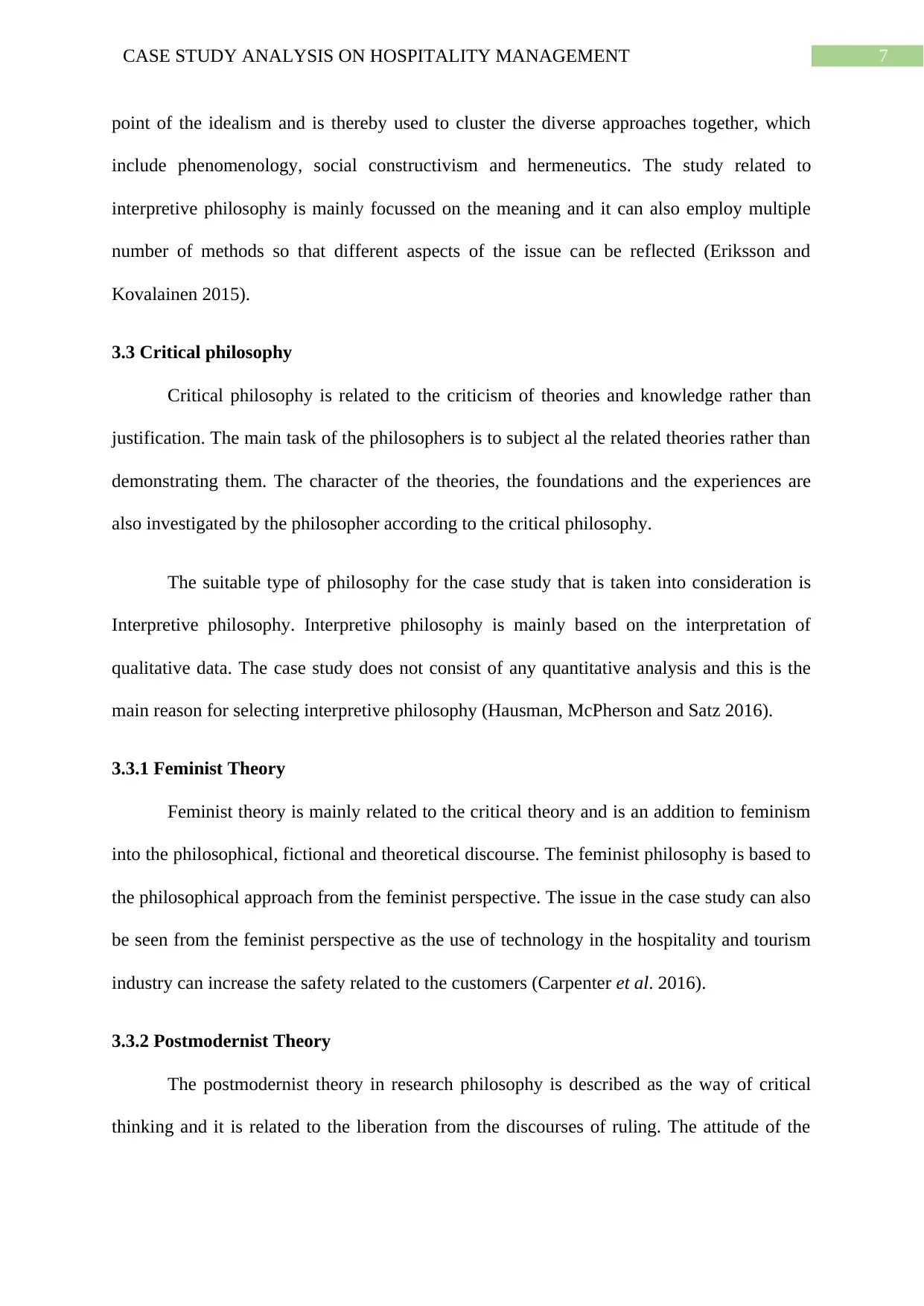
7CASE STUDY ANALYSIS ON HOSPITALITY MANAGEMENT
point of the idealism and is thereby used to cluster the diverse approaches together, which
include phenomenology, social constructivism and hermeneutics. The study related to
interpretive philosophy is mainly focussed on the meaning and it can also employ multiple
number of methods so that different aspects of the issue can be reflected (Eriksson and
Kovalainen 2015).
3.3 Critical philosophy
Critical philosophy is related to the criticism of theories and knowledge rather than
justification. The main task of the philosophers is to subject al the related theories rather than
demonstrating them. The character of the theories, the foundations and the experiences are
also investigated by the philosopher according to the critical philosophy.
The suitable type of philosophy for the case study that is taken into consideration is
Interpretive philosophy. Interpretive philosophy is mainly based on the interpretation of
qualitative data. The case study does not consist of any quantitative analysis and this is the
main reason for selecting interpretive philosophy (Hausman, McPherson and Satz 2016).
3.3.1 Feminist Theory
Feminist theory is mainly related to the critical theory and is an addition to feminism
into the philosophical, fictional and theoretical discourse. The feminist philosophy is based to
the philosophical approach from the feminist perspective. The issue in the case study can also
be seen from the feminist perspective as the use of technology in the hospitality and tourism
industry can increase the safety related to the customers (Carpenter et al. 2016).
3.3.2 Postmodernist Theory
The postmodernist theory in research philosophy is described as the way of critical
thinking and it is related to the liberation from the discourses of ruling. The attitude of the
point of the idealism and is thereby used to cluster the diverse approaches together, which
include phenomenology, social constructivism and hermeneutics. The study related to
interpretive philosophy is mainly focussed on the meaning and it can also employ multiple
number of methods so that different aspects of the issue can be reflected (Eriksson and
Kovalainen 2015).
3.3 Critical philosophy
Critical philosophy is related to the criticism of theories and knowledge rather than
justification. The main task of the philosophers is to subject al the related theories rather than
demonstrating them. The character of the theories, the foundations and the experiences are
also investigated by the philosopher according to the critical philosophy.
The suitable type of philosophy for the case study that is taken into consideration is
Interpretive philosophy. Interpretive philosophy is mainly based on the interpretation of
qualitative data. The case study does not consist of any quantitative analysis and this is the
main reason for selecting interpretive philosophy (Hausman, McPherson and Satz 2016).
3.3.1 Feminist Theory
Feminist theory is mainly related to the critical theory and is an addition to feminism
into the philosophical, fictional and theoretical discourse. The feminist philosophy is based to
the philosophical approach from the feminist perspective. The issue in the case study can also
be seen from the feminist perspective as the use of technology in the hospitality and tourism
industry can increase the safety related to the customers (Carpenter et al. 2016).
3.3.2 Postmodernist Theory
The postmodernist theory in research philosophy is described as the way of critical
thinking and it is related to the liberation from the discourses of ruling. The attitude of the
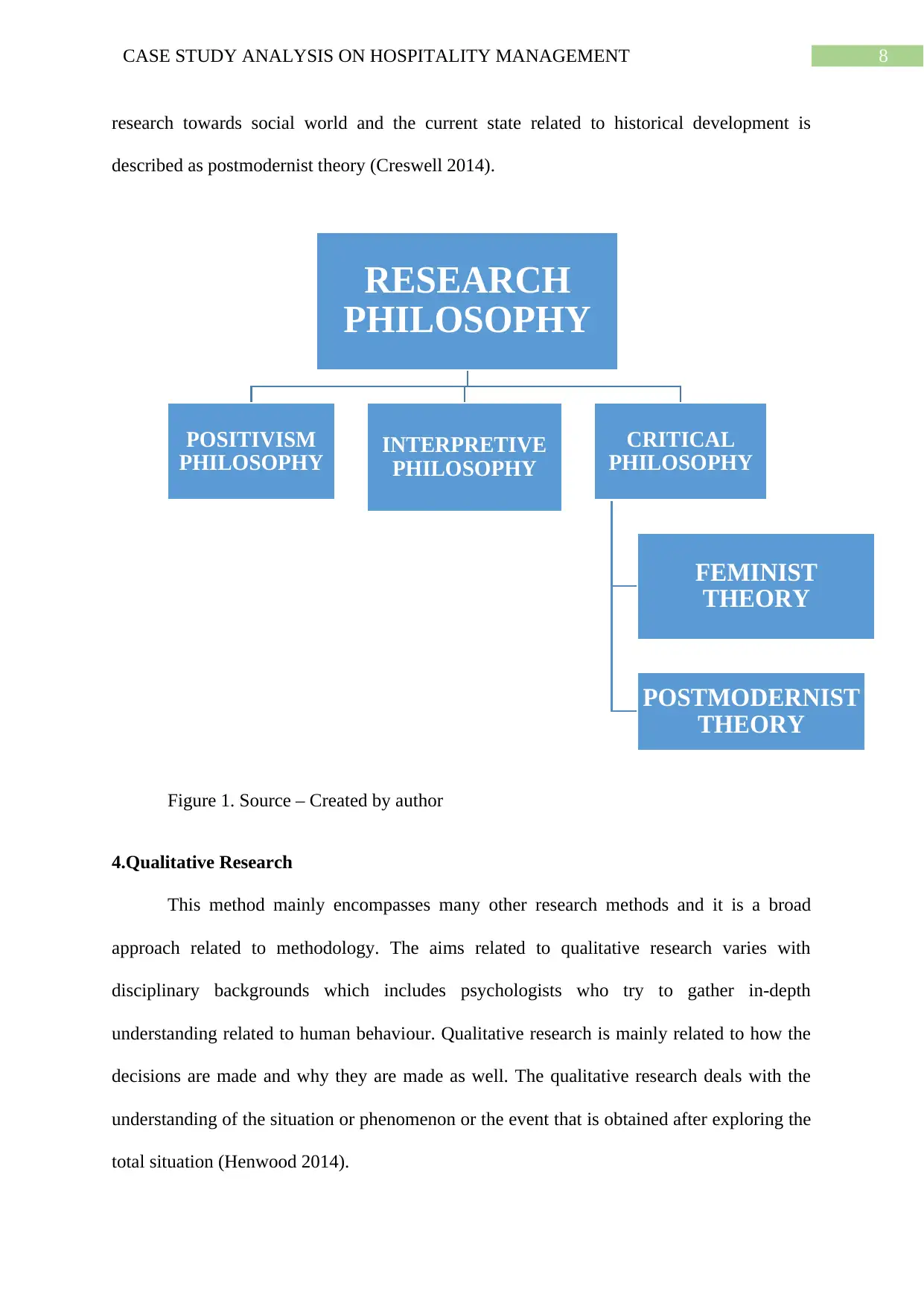
8CASE STUDY ANALYSIS ON HOSPITALITY MANAGEMENT
research towards social world and the current state related to historical development is
described as postmodernist theory (Creswell 2014).
Figure 1. Source – Created by author
4.Qualitative Research
This method mainly encompasses many other research methods and it is a broad
approach related to methodology. The aims related to qualitative research varies with
disciplinary backgrounds which includes psychologists who try to gather in-depth
understanding related to human behaviour. Qualitative research is mainly related to how the
decisions are made and why they are made as well. The qualitative research deals with the
understanding of the situation or phenomenon or the event that is obtained after exploring the
total situation (Henwood 2014).
RESEARCH
PHILOSOPHY
POSITIVISM
PHILOSOPHY INTERPRETIVE
PHILOSOPHY
CRITICAL
PHILOSOPHY
FEMINIST
THEORY
POSTMODERNIST
THEORY
research towards social world and the current state related to historical development is
described as postmodernist theory (Creswell 2014).
Figure 1. Source – Created by author
4.Qualitative Research
This method mainly encompasses many other research methods and it is a broad
approach related to methodology. The aims related to qualitative research varies with
disciplinary backgrounds which includes psychologists who try to gather in-depth
understanding related to human behaviour. Qualitative research is mainly related to how the
decisions are made and why they are made as well. The qualitative research deals with the
understanding of the situation or phenomenon or the event that is obtained after exploring the
total situation (Henwood 2014).
RESEARCH
PHILOSOPHY
POSITIVISM
PHILOSOPHY INTERPRETIVE
PHILOSOPHY
CRITICAL
PHILOSOPHY
FEMINIST
THEORY
POSTMODERNIST
THEORY
⊘ This is a preview!⊘
Do you want full access?
Subscribe today to unlock all pages.

Trusted by 1+ million students worldwide
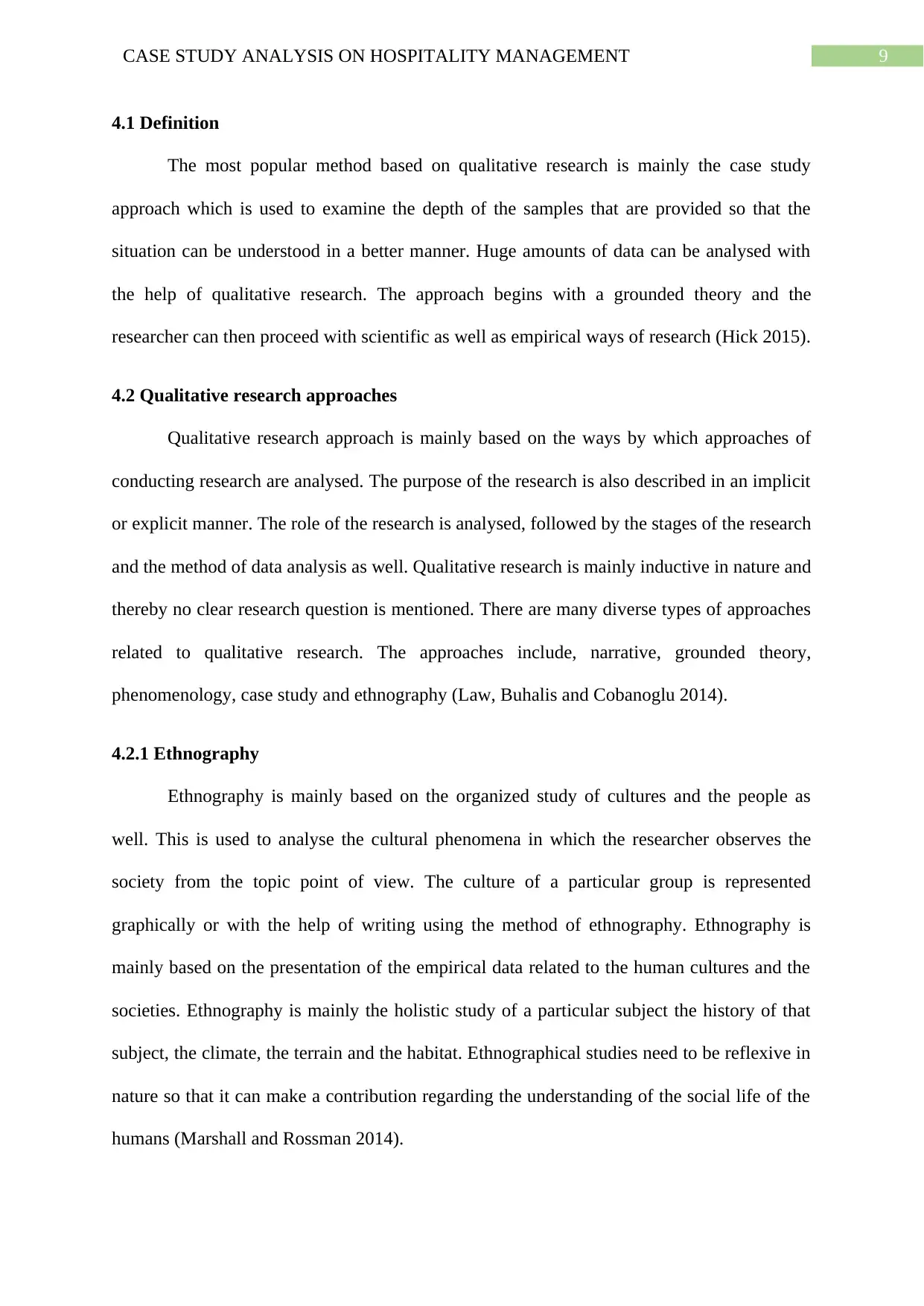
9CASE STUDY ANALYSIS ON HOSPITALITY MANAGEMENT
4.1 Definition
The most popular method based on qualitative research is mainly the case study
approach which is used to examine the depth of the samples that are provided so that the
situation can be understood in a better manner. Huge amounts of data can be analysed with
the help of qualitative research. The approach begins with a grounded theory and the
researcher can then proceed with scientific as well as empirical ways of research (Hick 2015).
4.2 Qualitative research approaches
Qualitative research approach is mainly based on the ways by which approaches of
conducting research are analysed. The purpose of the research is also described in an implicit
or explicit manner. The role of the research is analysed, followed by the stages of the research
and the method of data analysis as well. Qualitative research is mainly inductive in nature and
thereby no clear research question is mentioned. There are many diverse types of approaches
related to qualitative research. The approaches include, narrative, grounded theory,
phenomenology, case study and ethnography (Law, Buhalis and Cobanoglu 2014).
4.2.1 Ethnography
Ethnography is mainly based on the organized study of cultures and the people as
well. This is used to analyse the cultural phenomena in which the researcher observes the
society from the topic point of view. The culture of a particular group is represented
graphically or with the help of writing using the method of ethnography. Ethnography is
mainly based on the presentation of the empirical data related to the human cultures and the
societies. Ethnography is mainly the holistic study of a particular subject the history of that
subject, the climate, the terrain and the habitat. Ethnographical studies need to be reflexive in
nature so that it can make a contribution regarding the understanding of the social life of the
humans (Marshall and Rossman 2014).
4.1 Definition
The most popular method based on qualitative research is mainly the case study
approach which is used to examine the depth of the samples that are provided so that the
situation can be understood in a better manner. Huge amounts of data can be analysed with
the help of qualitative research. The approach begins with a grounded theory and the
researcher can then proceed with scientific as well as empirical ways of research (Hick 2015).
4.2 Qualitative research approaches
Qualitative research approach is mainly based on the ways by which approaches of
conducting research are analysed. The purpose of the research is also described in an implicit
or explicit manner. The role of the research is analysed, followed by the stages of the research
and the method of data analysis as well. Qualitative research is mainly inductive in nature and
thereby no clear research question is mentioned. There are many diverse types of approaches
related to qualitative research. The approaches include, narrative, grounded theory,
phenomenology, case study and ethnography (Law, Buhalis and Cobanoglu 2014).
4.2.1 Ethnography
Ethnography is mainly based on the organized study of cultures and the people as
well. This is used to analyse the cultural phenomena in which the researcher observes the
society from the topic point of view. The culture of a particular group is represented
graphically or with the help of writing using the method of ethnography. Ethnography is
mainly based on the presentation of the empirical data related to the human cultures and the
societies. Ethnography is mainly the holistic study of a particular subject the history of that
subject, the climate, the terrain and the habitat. Ethnographical studies need to be reflexive in
nature so that it can make a contribution regarding the understanding of the social life of the
humans (Marshall and Rossman 2014).
Paraphrase This Document
Need a fresh take? Get an instant paraphrase of this document with our AI Paraphraser
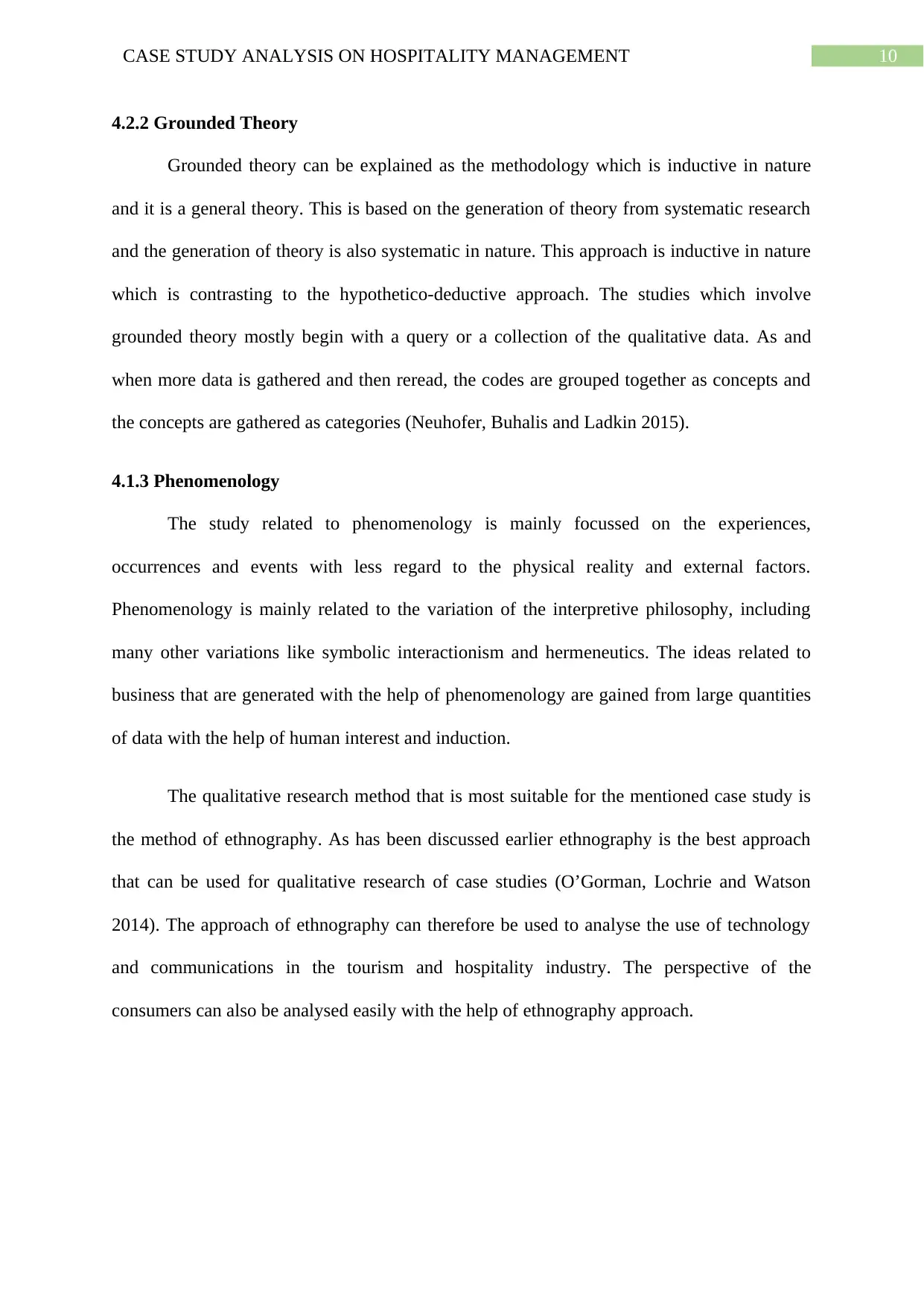
10CASE STUDY ANALYSIS ON HOSPITALITY MANAGEMENT
4.2.2 Grounded Theory
Grounded theory can be explained as the methodology which is inductive in nature
and it is a general theory. This is based on the generation of theory from systematic research
and the generation of theory is also systematic in nature. This approach is inductive in nature
which is contrasting to the hypothetico-deductive approach. The studies which involve
grounded theory mostly begin with a query or a collection of the qualitative data. As and
when more data is gathered and then reread, the codes are grouped together as concepts and
the concepts are gathered as categories (Neuhofer, Buhalis and Ladkin 2015).
4.1.3 Phenomenology
The study related to phenomenology is mainly focussed on the experiences,
occurrences and events with less regard to the physical reality and external factors.
Phenomenology is mainly related to the variation of the interpretive philosophy, including
many other variations like symbolic interactionism and hermeneutics. The ideas related to
business that are generated with the help of phenomenology are gained from large quantities
of data with the help of human interest and induction.
The qualitative research method that is most suitable for the mentioned case study is
the method of ethnography. As has been discussed earlier ethnography is the best approach
that can be used for qualitative research of case studies (O’Gorman, Lochrie and Watson
2014). The approach of ethnography can therefore be used to analyse the use of technology
and communications in the tourism and hospitality industry. The perspective of the
consumers can also be analysed easily with the help of ethnography approach.
4.2.2 Grounded Theory
Grounded theory can be explained as the methodology which is inductive in nature
and it is a general theory. This is based on the generation of theory from systematic research
and the generation of theory is also systematic in nature. This approach is inductive in nature
which is contrasting to the hypothetico-deductive approach. The studies which involve
grounded theory mostly begin with a query or a collection of the qualitative data. As and
when more data is gathered and then reread, the codes are grouped together as concepts and
the concepts are gathered as categories (Neuhofer, Buhalis and Ladkin 2015).
4.1.3 Phenomenology
The study related to phenomenology is mainly focussed on the experiences,
occurrences and events with less regard to the physical reality and external factors.
Phenomenology is mainly related to the variation of the interpretive philosophy, including
many other variations like symbolic interactionism and hermeneutics. The ideas related to
business that are generated with the help of phenomenology are gained from large quantities
of data with the help of human interest and induction.
The qualitative research method that is most suitable for the mentioned case study is
the method of ethnography. As has been discussed earlier ethnography is the best approach
that can be used for qualitative research of case studies (O’Gorman, Lochrie and Watson
2014). The approach of ethnography can therefore be used to analyse the use of technology
and communications in the tourism and hospitality industry. The perspective of the
consumers can also be analysed easily with the help of ethnography approach.
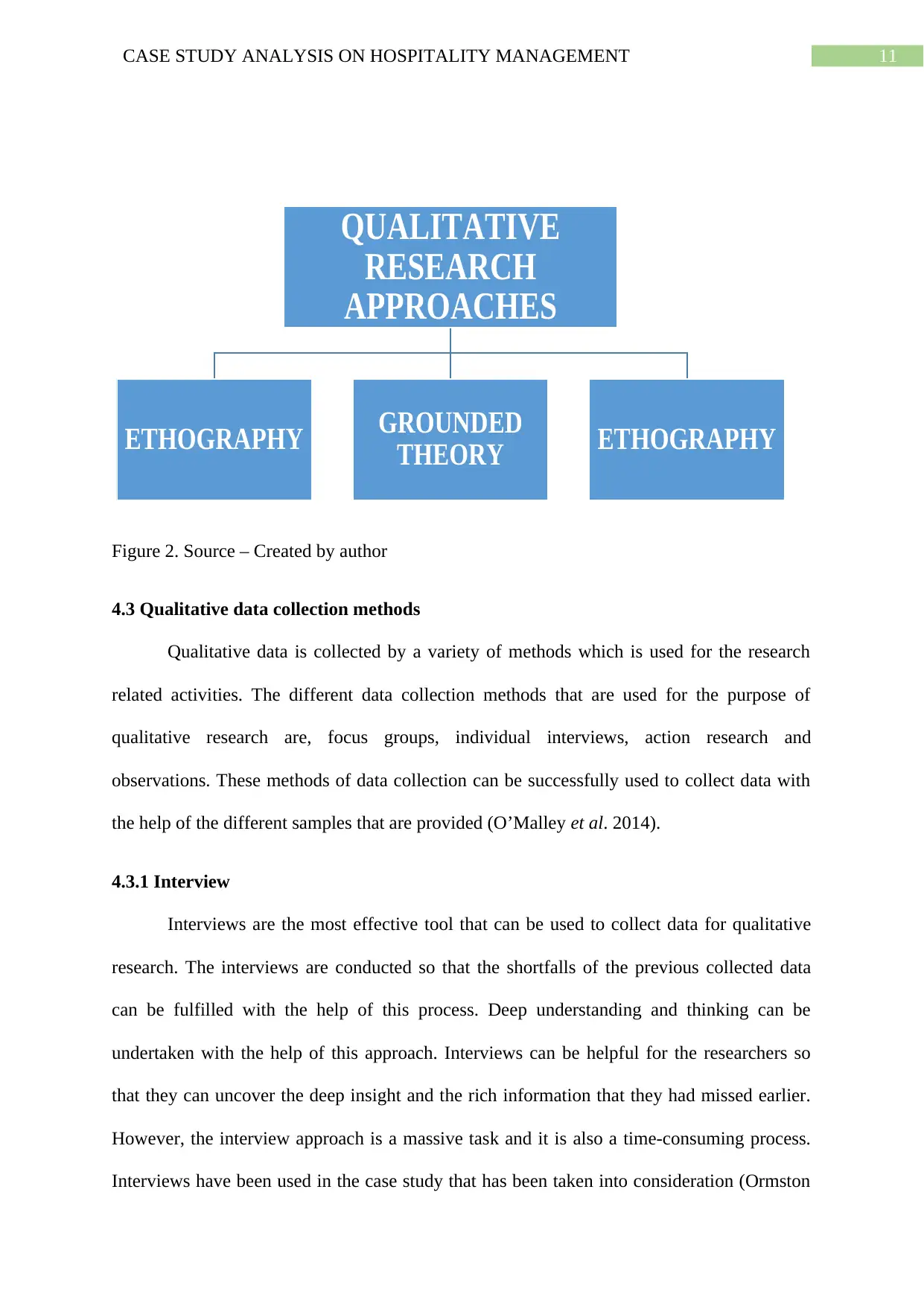
11CASE STUDY ANALYSIS ON HOSPITALITY MANAGEMENT
Figure 2. Source – Created by author
4.3 Qualitative data collection methods
Qualitative data is collected by a variety of methods which is used for the research
related activities. The different data collection methods that are used for the purpose of
qualitative research are, focus groups, individual interviews, action research and
observations. These methods of data collection can be successfully used to collect data with
the help of the different samples that are provided (O’Malley et al. 2014).
4.3.1 Interview
Interviews are the most effective tool that can be used to collect data for qualitative
research. The interviews are conducted so that the shortfalls of the previous collected data
can be fulfilled with the help of this process. Deep understanding and thinking can be
undertaken with the help of this approach. Interviews can be helpful for the researchers so
that they can uncover the deep insight and the rich information that they had missed earlier.
However, the interview approach is a massive task and it is also a time-consuming process.
Interviews have been used in the case study that has been taken into consideration (Ormston
QUALITATIVE
RESEARCH
APPROACHES
ETHOGRAPHY GROUNDED
THEORY ETHOGRAPHY
Figure 2. Source – Created by author
4.3 Qualitative data collection methods
Qualitative data is collected by a variety of methods which is used for the research
related activities. The different data collection methods that are used for the purpose of
qualitative research are, focus groups, individual interviews, action research and
observations. These methods of data collection can be successfully used to collect data with
the help of the different samples that are provided (O’Malley et al. 2014).
4.3.1 Interview
Interviews are the most effective tool that can be used to collect data for qualitative
research. The interviews are conducted so that the shortfalls of the previous collected data
can be fulfilled with the help of this process. Deep understanding and thinking can be
undertaken with the help of this approach. Interviews can be helpful for the researchers so
that they can uncover the deep insight and the rich information that they had missed earlier.
However, the interview approach is a massive task and it is also a time-consuming process.
Interviews have been used in the case study that has been taken into consideration (Ormston
QUALITATIVE
RESEARCH
APPROACHES
ETHOGRAPHY GROUNDED
THEORY ETHOGRAPHY
⊘ This is a preview!⊘
Do you want full access?
Subscribe today to unlock all pages.

Trusted by 1+ million students worldwide
1 out of 20
Related Documents
Your All-in-One AI-Powered Toolkit for Academic Success.
+13062052269
info@desklib.com
Available 24*7 on WhatsApp / Email
![[object Object]](/_next/static/media/star-bottom.7253800d.svg)
Unlock your academic potential
Copyright © 2020–2025 A2Z Services. All Rights Reserved. Developed and managed by ZUCOL.





